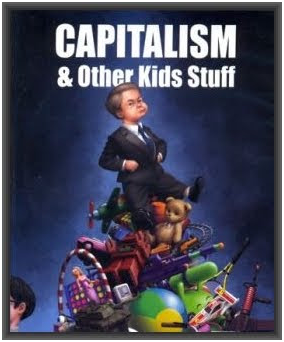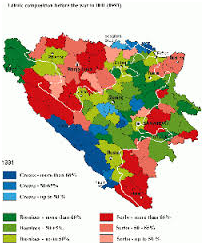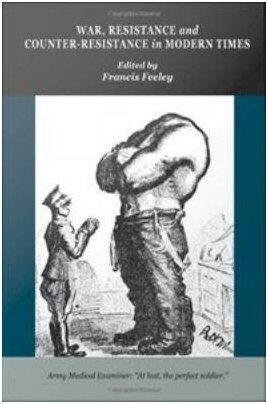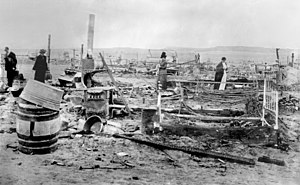Colloques/Conférences
Conférence des directeurs/directrices du CIESIMSA
à Grenoble, 18 janvier 2001.
"McDonald’s Corporation:
Past, Present, and Future Tense”, 15 mars 2001.
"Corporate
Control of the Media in the United States”, 10 mai
2001.
"Burn," film
de Gillo Pontecorvo, mardi 6 novembre 2001.
_______________________________________________________________________________
**********
Programme du Colloque
International de 11-12 janvier 2002 :
"Réflexions sur l'impact des entreprises
multinationales américaines dans la societé/Reflections on the Social Impact of American Multinational
Corporations"
· La Publication des Actes du Colloque des 11-12
janvier 2002
___________________________________________________________________
***********
Conférence sur les ouvrages de Howard Zinn, auteur
du livre, "Une histoire populaire des Etats-Unis,
11 decembre
2002.
Conférence sur
"The Media, Democracy and Human Rights", avec Noam Chomsky, 11 decembre 2002.
_________________________________________________________________________________________________________________________
********
Programme des Journées
d'Etudes internationals les 5 et 6 mai 2003 :
" L'Autre Coté de l'Amérique
", avec Professeur Howard Zinn, Professeur
Ronald Creagh, Serge Halimi, Gilbert Ackar, etc. . .
.
"L'Autre Coté de l'Amérique"
___________________________________________________________________________________
********
Conférence
avec
la
Professeur Hazel Rowley
6 novembre 2003
"The Life and Times of Richard Wright"
_________________________________________________________________________________________________________________________
*********
25 March 2004
Award-Winning Documentary
Film from the University of Colorado :
"The Ludlow Massacre"
_________________________________________________________________________________________________________________________
********
The History of Social Movements in the United States
1 April 2004
Award-winning Documentary
Film on the First Student Revolt against Corporate America :
"BERKELEY IN THE
60s"
__________________________________________________________________________________________________________________________
********
Programme du Colloque International
de 22 et 23 avril 2004 :
"L'Etat contemporain
de la culture politique américaine/The
Contemporary State Of American Political Culture", with Jim Hightower,
Susan DeMarco, Diana Johnstone, Philip Golub, and many more specialists of American society....
- La Publication des Actes du Colloque des
22-23 avril 2004
- Intervenants au colloque
- Biographie
des intervenants
___________________________________________________________________________________________________________________________
********
Programme du Colloque Régional des
27 janvier,
3 et 10 février 2005
"CORPORATE
AMERICA"
______________________________________________________________________________________________________________________________
*******
LE CENTRE DE RECHERCHE
CEIMSA-IN-EXILE
Center for the Advanced Study of American Institutions and Social
Movements
(temporarily located
at
The University of California)
VOUS PRESENTE :
BERKELEY IN
THE 60s
Mark Kitchell, producer
LE JEUDI, 21 AVRIL 2005
à
17h30
Maison des Langues et Cultures
Salle Jacques Cartier
_____________________________________________
·
This outstanding
documentary by Mark Kitchell, six years in the
making, is a comprehensive and insightful story of campus and community
activism as born at the University of California at Berkeley. Using extensive
archival footage and bridging the distance between past and present with more
recent interviews, Kitchell shows how a 1960 protest
aimed at the House Un-American Activities Committee was the launching point for
the Free Speech movement, which evolved into organized opposition against the
Vietnam War, support for the Black Panther party, and the feminist movement.
·
Berkeley was at the
epicenter as the counterculture politics of the '60s emerged. And revisiting
the political ferment of '60s Berkeley can offer an unusually helpful overview
of these interwoven political currents. This film does that very, very well. It
rises far,far above films
which simply recount the intense experimentation with sex, drugs & rock 'n'
roll . . . .
________________________________________________________
********
Conférence sur : "The United States Foreign Policy in Iraq"
4 October 2005
Two
Award-Winning Documentary Films on The War In Iraq :
______________________________________________________________________________________________________________________________
*********
Programme
de la Conférence Pacifiste
(du 5 au 7 avril 2006)
Program, abstracts, and CVs.
· La Publication des Actes du Colloque
*******
LE CENTRE DE RECHERCHE
CEIMSA-IN-EXILE
Center for the Advanced Study of American Institutions and Social
Movements
(temporarily located
at
The University of California)
VOUS PRESENTE :
The Un-Americans
(From the BBC TimeWatch series)
Archie Baron, producer
LE VENDREDI, 12 MAI 2006
à
17h30
Amphi 2
_____________________________________________
THE UNAMERICANS Between 1945 and the early 50's the lives of
thousands of ordinary citizens were destroyed because they were accused of
un-American activities. Government workers, teachers, union leaders, scientist,
artists, writers-anyone who expressed a liberal or leftwing opinion could be
identified as a Communist or a fellow traveler.
In this film both the
anti-Communists and the victims of the notorious McCarthy witchhunts
talk candidly about the era of anti-Communist hysteria and blacklists. We meet
men and women who had joined the Communist Party out of idealism and in
reaction to injustices in American society, such as poverty, and racism. They
had no thoughts of violently overthrowing the government and indeed, only
43,000 Americans were members of the Communist party.
More than 400 people
were brought to trial and about a third were sent to
prison and assessed huge fines. The execution of the Rosenbergs
was the culmination of the hysteria. Arthur Kinoy, a
constitutional lawyer, recalls his efforts to stay the execution. Archival
newsreels, old propaganda films, and newspaper cartoons recapture those days.
_____________________________________________________________________________________________________________________
**********
Local Conference on the
Anti-War Movement during the First World War
12 October 2006
with film :
Paths of Glory
directed by Stanely Kubrick
______________________________________________________________________________________________________________________
********
Local Conference on Anti-Imperialist Stuggles
in the Third World
and the origins of CIA collaboration with the OAS (Organisation
d'Armée Secret)
in Latin America
16 November 2006
with film :
The Battle of Algers
directed by Gillo Pontecorvo
.
*******
Local Conference on the African-American
Slave Trade and the Legacy of Racism in Europe and the U.S.A.
Le
jeudi, 1 février 2007
Le Passage du Milieu
(version française)
un
film de Guy Deslauriers
(avec la participation du Centre National de la Cinématographie et
avec le concours du Secrétariat d'Etat à l'Outre-Mer)
(Suivi par un débat animé par M. Milo Vouimba, artiste (en art plastique)
et Mlle. Rhonda Payne, étudiante du 3ème Cycle en littérature comparée à
l’Université Stendhal)
__________________________________________________________________________________________
*******
« Le patriarcat comparé et les institutions américaines »
18, 19, & 20 April 2007
L'Université de Savoie
à
Chambéry
Langue, Litterature,
Société
Université de Savoie à Chambéry
et
Francis McCollum Feeley
Professor of American Studies/
Director of Research
Université Grenoble-3
Grenoble, France
·
La Publication des Actes du Colloque des 5-7 avril
2007
______________________________________________________________________________________________________________________
*******
LE CENTRE DE RECHERCHE
CEIMSA-IN-EXILE
Center for the Advanced Study of American Institutions and Social
Movements
(temporarily located
at
The University of California)
VOUS PRESENTE
Le
film documentaire :
The Corporation
Mark Achbar, producer
LE JEUDI, 4 OCTOBRE 2007
à
17h30
Amphi IV
_____________________________________________
THE CORPORATION explores the nature and spectacular
rise of the dominant institution of our time. Footage from pop culture,
advertising, TV news, and corporate propaganda, illuminates the corporation's grip
on our lives. Taking its legal status as a "person" to its logical
conclusion, the film puts the corporation on the psychiatrist's couch to ask
"What kind of person is it?" Provoking, witty, sweepingly
informative, The Corporation includes forty interviews with corporate insiders
and critics - including Milton Friedman, Noam Chomsky, Naomi Klein,
and Michael
Moore - plus true confessions, case studies and strategies for
change.
Winner of 24 INTERNATIONAL AWARDS, 10 of them AUDIENCE CHOICE AWARDS including
the AUDIENCE AWARD for DOCUMENTARY in WORLD CINEMA at the 2004 SUNDANCE FILM
FESTIVAL.
This film is based on the book The Corporation: The Pathological Pursuit of Profit and Power by Joel Bakan.
.
________________________________________________________________________________
*******
Center for the Advanced Study of American Institutions and Social
Movements
(provisoirement hébergé à l’Université de Californie)
VOUS PRÉSENTE :
Falluja
&
Control
Room
(En anglais)
MARDI 18 DÉCEMBRE 2007
17h30, Grande salle des Colloques
Université Stendhal – Grenoble 3

Ten days after the siege
of Falluja was lifted, Toshikuni
Doi, a Japanese independent journalist, went into Falluja. His documentary, investigates the causes of,
conditions during, and damages from the siege.
___________________________________________________________________________________________.
*******
Dans le cadre du 4ème mois américaine
à
Grenoble
Michel DESTOT
Maire de Grenoble
Député de l'Isère
vous
prie de bien vouloir assister à
l'inauguration de l'exposition
![]()
Benjamin Franklin
-tricentenaire de sa naissance-
le mercredi,
7 novembre 2007
à 18
heures 30
Maison de l'International
-Jardin de Ville-
à
l'initiative de l'Association
France Etats-Unis Grenoble
Une Conférence sur Benjamin FRANKLIN :
"l'amitié franco-américaine"
sera donnée par
Monsieur Francis FEELEY,
Professeur de civilisation américaine à
l'Université Stendhal
le lundi 19 novembre 2007 à 18 heures 30,
salle Julliet Berto,
passage du Palais de Justice
______________________________________________________________________________________________________________
*******
Centre d'Information Inter-Peuples
Rencontre-Débat
"Contre les terrorismes, d'Etat et de
Groupes"
mercredi, 5 décembre 2007
20H
Maison du Tourisme
Grenoble
__________________________________________________________________________________________________
*******
LES RENCONTRES DECITRE
Conference de
Presse
samedi, 19 janvier 2008
de
16h à 18h
Librairie-Café Decitre
9-11 Grande Rue
Grenoble
"Les movements
pacifistes américanes et française, hier et
aujourd'hui"
avec
Francis McCollum Feeley
Ronald Creagh
Marc Ollivier
Patrick Moreno
www.decitre.fr
______________________________________________________________________________________________________
*******
UNIVERSITE DE GRENOBLE
RADIO CAMPUS
PRESENTE
L’Émission
"Brin de Justice"
mardi, 4 mars 2008
avec
le Professeur Francis McCollum Feeley
sur
"L'économie
politique de la surveillance dans la société contemporaine "
____________________________________________________________________________________________________________
***********
"War, Resistance, and Counter-Resistance in the U.S.A. and
France"
Université Paris X
(Nanterre)
Friday, 11 April 2008
10 AM to 7 P.M
Amphi S-2 on the Nanterre campus

_____________________________________________________________________________________________________________
*******
Conférences-débats Avril-
Mai 2008
En
libre accès co organisées en partenariat avec différentes
associations
Tonneau de Diogène, 6 place Notre Dame, 38000 Grenoble ;
tel : 0476 42 38 40
(Tram B : arrêt Notre
Dame)
Sites à consulter pour les évolutions du programme : www.amis.monde-diplomatique.fr ou http://www.monde-diplomatique.fr
- Mardi
29 Avril à 20h30 au Tonneau « USA : les non-dits,
ou les influences invisibles, des prochaines élections présidentielles» avec Francis
Mc Collum FEELEY(universitaire).
__________________________________________________________________________________________________
******
CEIMSA-IN-EXILE
Center for the Advanced Study of American Institutions and Social
Movements
VOUS PRÉSENTE :
Le Monde Selon Monsanto
(version française)
MARDI, 6 MAI 2008
17h30, Grande salle des Colloques
Université Stendhal – Grenoble 3
Present in 46 countries,
Monsanto has become the world leader in GM crops,as
well as becoming one of the most controversial companies in industrial history.
Since its founding in 1901, this corporation has faced trial after trial
because of the toxicity of its products. Today it has “reinvented itself as a
“life sciences” company. . . . amid a lack of
any proper controls with respect to their effects on nature and human health.
_________________________________________________________________________________________________________
*******
Lundi 29 Septembre 2008
Rencontre-Débats
avec
Professeur Jennifer Pitts
Professeure
d’histoire à l’université de Chicago aux États-Unis
(assistée par Francis FEELEY, Professeur des Études américaine à Université de Grenoble-3)
à 17h30,
dans la salle Jacques Cartier, à la Maison de Langue et Culture, sur le
Campus
et
à 20h30,
au Tonneau de Diogène, 6 place Notre Dame, au centre ville de Grenoble
sur son livre,
Naissance
de la bonne conscience coloniale,
Les libéraux britanniques et français face à la question impériale (1770-1870)
Original title:
A Turn to Empire: The Rise of Imperial Liberalism in Britain and France
(Princeton University Press,
2005)
par Jennifer PITTS
Professeur d'histoire à l'Université de Chicago
Sujet
de conférence à 17h30 sur le campus :
La
méthodologie de recherche que l'auteur a mise en oeuvre
pour cette étude historique.
Sujet de conférence à 20h30 au centre ville :
Les libéraux britanniques et français face à la question impériale
(1770-1870). Les racines idéologiques des colonialismes ou comment la pensée
libérale, critiquant la tyrannie au XVIIIème siècle, en est venue à justifier
les empires au XIXe siècle ? C’est le sujet de l’ouvrage de Jennifer Pitts (Éditions de l’Atelier) et dont elle débattra avec
nous.
Quels
arguments ont pu justifier la domination coloniale des nations européennes sur
le monde ? Par quel processus les idéaux des Lumières prônant l’égalité fondamentale
de tous les êtres humains ont-ils été retournés pour cautionner
l’asservissement de peuples entiers au XIXe siècle ? Comment certains penseurs
libéraux, si virulents à l’égard du despotisme en Europe, ont-ils pu prôner,
sans l’ombre d’un remords, la conquête des Amériques, de l’Inde, de la Chine
puis de l’Afrique par les nations occidentales ? Dans un essai rigoureux,
Jennifer Pitts expose d’abord les critiques acerbes
que des penseurs britanniques tels Adam Smith, Jeremy Bentham et Edmund Burke
formulent à l’égard de la domination impériale de l’Inde par la Grande-Bretagne
à la fin du XVIIIe siècle. Puis elle analyse le glissement progressif de la
pensée libérale qui, sous l’influence de philosophes comme John Stuart Mill,
réduit les autres civilisations du monde au rang de peuples « arriérés » et «
barbares ». Bientôt c’est Tocqueville, penseur de la démocratie, qui se fait le
promoteur de la colonisation de l’Algérie par la France.
La régression est si manifeste qu’au milieu du XIXe siècle, des deux côtés de
la Manche, pratiquement plus aucun intellectuel n’est prêt à élever la voix
contre un système qui spolie et massacre les peuples indigènes aux Indes, aux
Amériques, en Algérie… En remontant aux sources intellectuelles de la bonne
conscience coloniale, Jennifer Pitts apporte une
contribution essentielle à la compréhension de la première mondialisation si
brillamment analysée par C. A. Bayly dans La
naissance du monde moderne (Le Monde Diplomatique/Éditions de
l’Atelier, 2006). 384 p. - 24,90 € - ISBN : 978-2-7082-3982-1 Code Sofedis/Sodis : S387764
Jennifer Pitts est professeure d’histoire à
l’université de Chicago aux États-Unis. Elle a également traduit et publié en
anglais une sélection d’écrits de Tocqueville sur l’empire et l’esclavage.
Michel Cordillot, traducteur de cet ouvrage, est
professeur de civilisation américaine à l’université Paris VIII. Il a notamment
publié La Sociale en Amérique, Dictionnaire biographique du mouvement
ouvrier francophone aux États-Unis (1848-1922) (Les Éditions de
l’Atelier, 2002).
__________________________________________________________________________________
*******
Mercredi 5 Novembre 2008
à
20h30
Rencontres-débats à Grenoble
www.amis.monde-diplomatique.fr et/ou http://www.monde-diplomatique.fr
Présentation critique des programmes des
candidats,
après les élections aux USA
avec
Francis Mc Collum FEELEY
Libres
d’accès. Lieu de principe, au Tonneau de Diogène, 6 place Notre
Dame, 38000 Grenoble ; tel : 0476 42 38 40.
(Tram B : arrêt Notre Dame).
___________________________________________________________________________________________
*******
Le jeudi, 13 novembre 2008
à 17h30
FILM
de William Wellman
(VOSTFR)
"Les
enfants de la crise"
(Wild boys of the road)
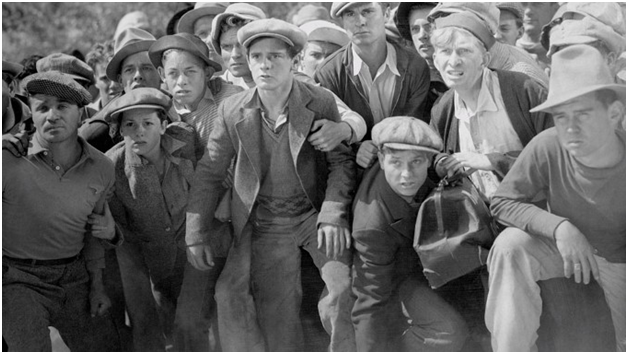
(USA, 1933,1h15)
L'Université Stendhal
Amphi 1
Pendant la Grande Dépression des années 30 aux USA des centaines de milliers d'adolescents
miséreux se retrouvent à errer sur les routes, tenaillés par la faim et traqués
par la police.Tommy et Eddie, deux adolescents de la
classe moyenne, ne savent pas, lorsqu'ils invitent leurs petites amies à une
fête de collège, qu'ils vivent leur dernière belle soirée. Le soir même, Tommy
avoue à Eddie que sa mère, au chômage, en est réduite, à l'emmener à la soupe
populaire. Chez lui, Eddie découvre que son père a été renvoyé de la
cimenterie. La situation ne s'améliorant pas, les deux copains décident de
chercher du travail sous des cieux plus hospitaliers. Ils se jettent, la nuit
venue, sur la plate-forme d'un train de marchandises. Au matin, ils se
querellent avec un autre vagabond, qui s'avère être une fille, Sally. Le trio,
devenu inséparable, va vivre la vie des Hobos, se
réfugiant dans des bidonvilles, empruntant clandestinement les trains pour se
déplacer, une vie faite de lutte contre la misère de révolte contre les
autorités ( avec une scène d'émeute lorsque la police
vient les déloger d'un bidonville unique dans l'histoire du cinéma) et aussi de
solidarité.
Rarement le cinéma hollywoodien est allé aussi loin dans sa peinture d'une
Amérique différente, à l'opposé de celle de Wall Street et du grand rêve de
réussite sociale. Sans temps mort, sans atermoiement pour ses personnages, sans
concession pour les autorités, un film noir très politique qui pose un regard
cru sur la société délabrée, un film d’action social comme seul le Pré-Code a
pu en donner avec en particulier les films sociaux de la Warner. Après c’était
trop tard et il aura fallu attendre les années 60, pour que les studios
retrouvent cette liberté. Malgré un final moralisateur (l'Etat roosveltien et son New Deal règlera tout) imposé par des
producteurs, effrayés par ce qu’ils avaient financé, l’audace de ce film de Wellman saisit encore aujourd’hui.
Projection du film avec en introduction la projection d'une sélection de
photographies prises pendant la Grande Dépression, animé par M. Dominique Jégou
et Professeur Francis Feeley.
English version
During the Great
Depression of the 1930s thousands of miserable adolescents wandered the highways
and byways of the United States, racked by hunger and harassed by the police.
Tommy and Eddie, two adolescents from the middle class, had no way of knowing
when they invited their girlfriends to a college party that this would be their
last evening party together. That same night, Tommy confessed to Eddie that his
mother, who had been unemployed, was now reduced to joining the bread line.
Eddie, returning home from the party, discovers that his father had been fired
from the cement works. The boys' situations do not improve, and the two friends
decide to look for work under more friendly skies. The next night they jump a
transport train, and in the morning get in an argument with another vagabond
who turns out to be a female named Sally. The trio becomes inseparable and will
live the life of Hobos, seeking refuge in the camps, jumping trains secretly to
travel from one place to another across the continent, a life of struggle
against misery, of revolt against the authorities (including a riot scene unique
in the history of cinema, when the police come to expel them from their camp)
and also of solidarity.
Rarely has the Hollywood cinema gone so far in its port rail of an different America, opposite to that of Wall Street and
the "American Dream." With no slack moments, no procrastination in
character developments, no compromises with the authorities, this film
noir is political and casts a cold eye on a society in disrepair. This
is a social action movie as only the Pre-Code Hollywood could deliver, particularly
as concerns the social films of Warner. Later it was too late and the public
would have to wait for the 1960s, when again the studios found its freedom. The
moralizing ending of this film, which reflects the Roosevelt Stateist propaganda of the era (namely that the New Deal
will solve all problems) was imposed by the producers, who found themselves
alarmed by what they had financed, Nevertheless, the audacity of this movie by
Wellman is compelling even today, 75 years later.
This film will be shown at Stendhal University in Amphitheater 1, on Thursday,
13 November at 17h30, along with the projection of a photographic exhibit of
scenes from the Great Depression, animated by M. Dominique Jégou and Professor
Francis Feeley.
________________________________________________________________________________________________
*******
Le mardi, 10 février 2009
à 12h30
FILM by Robert Uth
followed by a discussion
"The March of the
Bonus Army "
(USA, 2006, approx. 30
minutes)
L'Université Stendhal

In 1924, a grateful Congress
voted to give a bonus to World War I veterans - $1.25 for each day served
overseas, $1.00 for each day served in the States. The catch was that payment
would not be made until 1945.
|
Members
of the Bonus Army |
However, by 1932 the nation
had slipped into the dark days of the Depression and the unemployed veterans
wanted their money immediately.
In May of that year,
some 15,000 veterans, many unemployed and destitute, descended on Washington,
D.C. to demand immediate payment of their bonus. They proclaimed themselves the
Bonus Expeditionary Force but the public dubbed them the "Bonus
Army." Raising ramshackle camps at various places around the city, they
waited.
The veterans made their
largest camp at Anacostia Flats across the river from the Capitol.
Approximately 10,000 veterans, women and children lived in the shelters built
from materials dragged out of a junk pile nearby - old lumber, packing boxes
and scrap tin covered with roofs of thatched straw.
Discipline in the camp
was good, despite the fears of many city residents who spread unfounded
"Red Scare" rumors. Streets were laid out, latrines dug, and
formations held daily. Newcomers were required to register and prove they were bonafide veterans who had been honorably discharged. Their leader, Walter Waters, stated, "We're here for the
duration and we're not going to starve. We're going to keep ourselves a
simon-pure veteran's organization. If the Bonus is paid it will relieve to a
large extent the deplorable economic condition."
June 17 was described by
a local newspaper as "the tensest day in the capital since the war."
The Senate was voting on the bill already passed by the House to immediately
give the vets their bonus money. By dusk, 10,000 marchers crowded the Capitol
grounds expectantly awaiting the outcome. Walter Waters, leader of the Bonus
Expeditionary Force, appeared with bad news. The Senate had defeated the bill
by a vote of 62 to 18. The crowd reacted with stunned silence. "Sing
America and go back to your billets" he commanded, and they did. A silent
"Death March" began in front of the Capitol and lasted until July 17,
when Congress adjourned.
A month later, on July
28, Attorney General Mitchell ordered the evacuation of the veterans from all
government property, Entrusted with the job, the Washington police met with
resistance, shots were fired and two marchers killed. Learning of the shooting
at lunch, President Hoover ordered the army to clear out the veterans. Infantry
|
Troops prepare to evacuate the |
and cavalry supported by six tanks were dispatched
with Chief of Staff General Douglas MacArthur in command. Major Dwight D.
Eisenhower served as his liaison with Washington police and Major George Patton
led the cavalry.
By 4:45 P.M. the troops
were massed on Pennsylvania Ave. below the Capitol. Thousands of Civil Service
employees spilled out of work and lined the streets to watch. The veterans,
assuming the military display was in their honor, cheered. Suddenly Patton's
troopers turned and charged. "Shame, Shame" the spectators cried.
Soldiers with fixed bayonets followed, hurling tear gas into the crowd.
By nightfall the BEF had
retreated across the Anacostia River where Hoover ordered MacArthur to stop.
Ignoring the command, the general led his infantry to the main camp. By early
morning the 10,000 inhabitants were routed and the camp in flames. Two babies
died and nearby hospitals overwhelmed with casualties. Eisenhower later wrote,
"the whole scene was pitiful. The veterans were
ragged, ill-fed, and felt themselves badly abused. To suddenly see the whole
encampment going up in flames just added to the pity."
References:
Bartlett, John Henry, The Bonus March and
the New Deal (1937); Daniels, Roger, The Bonus March;
an Episode of the Great Depression (1971).
___________________________________________________________________________________________________
*******
Lundi 16 mars, 15h30 – 17h30
Université Stendhal
Amphi 4
Cours alternatif en études anglophones
par Francis
Feeley et Sheila Whittick
"L'énigme
canadienne" est due à une double colonisation --personnel et collective à
la fois, par la tradition britannique et par le capital
états-uniennes. Dans ce cours nous discuterons la colonisation de
l'esprit et de l'économie politique, avec un film sur le génocide des
amérindiens en Canada.
UNREPENTANT: KEVIN ANNETT
AND CANADA'S GENOCIDE
(Documentary - 16 mars 2009)
1:48:56
http://video.google.com/videoplay?docid=-6637396204037343133
________________________________________________________________________
***********
Cours alternatifs
les 4 et 18 mars 2009
UNIVERSITY WITHOUT WALLS/UNIVERSITE HORS LES
MURS
dans des trams de Grenoble
En
mercredi le 4 mars et encore le 18 mars 2009, à partir de 16h, le "cours
alternatif" de civilisation américaine du professeur Francis Feeley de
l'Université de Grenoble était tenu dans des trams de Grenoble. Pendant deux
heurs ses étudiants ont discutés les sujets suivants : "le génocide
des amérindiens par les européens et les américains depuis 1500", "la
Déclaration d'Independence en 1776", "l'émancipation des esclaves en
1863", "la condition des femmes chez les amérindiens et les euro-américains",
"les concepts différents de la démocratie aux États-Unis",
"l'inégalité économique en Amérique d'aujourd'hui", parmi d'autres
sujets . . . .
http://www.youtube.com/profile?user=feeleyf&view=videos
VIDEO
(28 minutes)
4 mars 2009
Première Partie (9:27
minutes)
Seconde Partie (9:33
minutes)
Trosième Partie (9:23
minutes)
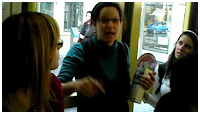
VIDEOS
(17 X 2:33 minutes)
18 mars 2009
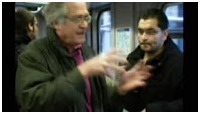
"Cours alternatif" dans des trams de Grenoble : la civilisation
américaine pedant
la 7ème semaine de la grève universitaire.

________________________________________________________________________
***********
Cours alternatif
le 1 avril 2009
14h30
Amphi 4
Capitalism and Other
Kids' Stuff is a new DVD from
the Socialist Party of Great Britain which asks us to take a fresh look at the
world we live in and to question some of the most basic assumptions about life
in capitalism.
After this film, Professor Feeley will lead a discussion on human
relationships in post-capitalist society.
________________________________________________________________________
***********
Cours alternatif en civilisation américaine
Un débat
après le film "Missing - Porté disparu"
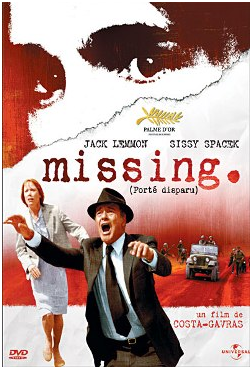
le 8 avril 2009
When: Wed, April 8, 2:30pm – 4:30pm.
Where: Stendhal,
Amphi 7.
Description: Le
film Missing - Porté disparu (version
française -1982). Un couple d'américains, vivent tranquille à Santiago du Chili.
Jusqu'à ce jour du 11 septembre 1973, date à laquelle éclate un coup d'état
emmené par le général Pinochet... Depuis ce jour, le mari a disparu. Son père
décide de se rendre sur place pour élucider cette disparition.
Realisateur: Costa
Gavras.
Acteurs
principaux: Jack Lemmon, Sissy Spacek, John Shea.
Durée: 125
mn.
Débat après
la séance, animée par Francis Feeley, Prof. d'Etudes
américaines et Franck Gaudichaud, Prof. d'Espagnol.
________________________________________________________________________
***********
Cours alternatif en civilisation américaine
"Le système de santé américain : privé ou publique?"
le 29 avril 2009
When: Wed, April 29, 2:30pm – 4:30pm.
Where: à l'entrée
des Urgences à l'hôpital du Nord.
Description: Chers
clients de l'hôpital du Nord,
Nous
sommes étudiants à l'Université Stendhal et cette après midi notre cours aura
lieu en plein air près de l'entrée des Urgences de l'hôpital.
Nous
souhaitons vous inviter à vous joindre à nous, en effet nous allons parler
et débattre du système de santé Américain et les dangers de celui-ci s'il
était imposé en France.
Si
vous souhaitez vous joindre à nous, nous suggérons que vous vous inscriviez à
la réception dans le bâtiment des urgences, aussi veuillez préciser le temps que
vous avez à votre disposition. Comme vous le savez peut être déjà, le temps
d'attente est très long en salle d'urgence.
Si
vous pouvez vous joindre à nous 10, 15, 30 minutes voire plus, nous nous
réjouissons de vous inclure dans notre discussion.
Vous trouverez notre petit groupe à une table de pic nique se trouvant à une
minute à pied de l'autre côté des railles du tram, à l'opposé des urgences.
Nous
espérons que vous vous joindrez à nous afin de débattre du système de santé Américain
et des raisons pour lesquelles il serait néfaste de l'importer en France !
_______________________________________________________________________
***********
Colloque
international du 6 Mai 2009
Université de Paris à Nanterre
6 mai 2009 : Colloque international organisé
par Francis Feeley (Grenoble + CREA) : "The Role
of Ethics in the Class Society of Contemporary
America"
Centre de Recherches Anglophones (CREA) et Politiques américaines (PA)
"Rôle
de l'éthique dans la société de classe de l'Amérique contemporaine/
The Role of Ethics in the
Class Society of Contemporary America"
Exposé
des motifs avec le programme entier :
http://anglais.u-paris10.fr/spip.php?article1275
Publications
Jean Bricmont teaches physics in Belgium. He has been
involved in various debates and movements of opposition to the recent imperial
wars, in particular the BRussells Tribunal
(http://www.brusselstribunal.org/). His last book, Humanitarian
Imperialism, has been published by Monthly Review Press.
"Zionism, the ideological
conflict of our time?"
http://www.demerdezvous.org/2010/03/04/s-conflit-ideologique-de-notre-temps/
Abstract
The recent conflict in Gaza has once more brought out the deep
split that exists between the perception of the conflict that prevails in the
West and that of the Arab-Muslim world, including here in our own "banlieues". The root of that difference goes back
farther than the 1967 war and the Occupation of the Territories to the Zionist
ideology on which are based the creation and justification of the State of
Israel. The talk will focus on a critical examination of that ideology as well
as on the use of the accusation of anti-Semitism to prevent such examination.
No genuine progressive politics will be possible so long as the left is not
reconciled on these issues with the part of the working class of Arab-Muslim
origin and has not radically broken with the Zionist vision of the conflict.
________________________________________________________________________
***********
Cours alternatifs
les 3 et 10 juin 2009
16h30
dans
La Grande Salle des
Colloques
Université Stendhal
The U.S. Film Series on Social Movements and the Individual in the
Early 20th Century
sponsored by CEIMSA
(Center for the Advanced Study of American Institutions and
Social Movements)
Followed by a discussion with Francis Feeley and Dominique Jégou.
Mercredi, 3 juin 2009
16h30-18h30
This film shows how a
group of mainly Hispanic miners who are discriminated against with dangerous
working conditions and unsanitary housing better their lot through industrial action.
But in the process the miners also have to change their attitudes towards
women, so that the film acts against several social injustices at once. The
film remains powerful even though it was made 50 years ago.
People unaware of the hundreds of thousands of workers who struck for better
conditions, pay and housing for us all will learn much from this film. Based on
a true story, “Salt Of The Earth” also dares to bring
up women's rights. This film portrays the true story of Mexican American miners
in America striking for better conditions. However, unlike many other union
portrayals this takes on an incredible new slant when the male miners can no
longer legally strike and their wives and daughters take over the picket line
for them. A rare movie equating good working conditions for
men AND developing the "woman's question." The film was
censored soon after release as communist fodder and the lead actress (one of
only five paid actors - the majority of the cast had participated in the actual
strike) was deported to Mexico. This puts The Grapes of Wrath to shame!
___________________________________________________________________________________________________
***********
The U.S. Film Series on Social Movements and the Individual in the
Early 20th Century
Mercredi, 10 juin 2009
16h30-18h30
La quête de liberté d’un homme injustement
traqué La première guerre mondiale touche à sa fin, et Johnny est sur le chemin
du retour. Mais un ancien combattant comme lui ne trouvera ni accueil fastueux
ni véritable travail à son arrivée. Injustement accusé, il mènera la vie sans
avenir d’un fugitif. Deux fois il sera envoyé au bagne. Deux fois il s’en
échappera. Si il se laisse enchaîner, ce n’est pas
pour autant qu’il se laisse voler sa liberté. Paul Muni nous livre une
interprétation magistrale dans ce grand classique du cinéma réalisé par Melvyn LeRoy (Petit César) et
inspiré du récit autobiographique de Robert E. Burns, évadé du bagne. A l’image
de nombreuses productions des années 30, ce film très réaliste est d’une grande
intensité et nous montre la dure réalité des forçats. Il fit s’élever de
nombreuses voix qui favorisèrent la mise en place d’une vaste réforme pénale.
Burns lui-même fut inculpé. Il n’aurait pas pu mieux faire, si ce n’est être un
véritable fugitif.
______________________________________________________________________________
***********
Conférence de Presse
13 octobre 2009
Librairie Decitre
See, also, the presentation of this book at : http://www.univ-paris8.fr/RING/spip.php?article633
with photo exhibit of Colloque in Chambéry, April 2007
. . . .
http://dimension.ucsd.edu/CEIMSA-IN-EXILE/colloques/Patriarcat/Programmepatriarcat.pdf
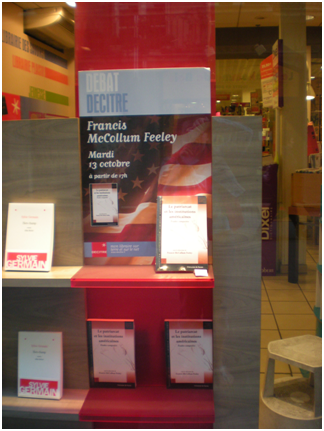
PHOTOS FROM THE
"CONFERENCE DE PRESSE" AT THE DECITRE BOOKSTORE
***********
LE CENTRE DE RECHERCHE
CEIMSA-IN-EXILE
Center for the Advanced Study of American Institutions and Social
Movements
(temporarily located
at
The University of California)
VOUS PRESENTE :
The Un-Americans
(From the BBC TimeWatch series)
Archie Baron, producer
LE MARDI, 20 OCTOBRE 2009
à
17h30
Amphi 2
____________________________________________
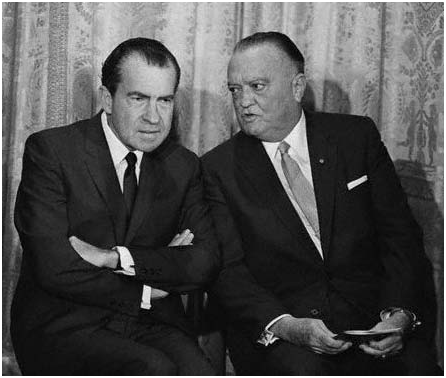
Between 1945 and the early 50's the lives of
thousands of ordinary citizens were destroyed because they were accused of
un-American activities. Government workers, teachers, union leaders, scientist,
artists, writers-anyone who expressed a liberal or leftwing opinion could be
identified as a Communist or a fellow traveler.
In this film both the
anti-Communists and the victims of the notorious McCarthy witchhunts
talk candidly about the era of anti-Communist hysteria and blacklists. We meet
men and women who had joined the Communist Party out of idealism and in
reaction to injustices in American society, such as poverty, and racism. They
had no thoughts of violently overthrowing the government and indeed, only
43,000 Americans were members of the Communist party.
More than 400 people
were brought to trial and about a third were sent to
prison and assessed huge fines. The execution of the Rosenbergs
was the culmination of the hysteria. Arthur Kinoy, a
constitutional lawyer, recalls his efforts to stay the execution. Archival
newsreels, old propaganda films, and newspaper cartoons recapture those days.
________________________________________________________________________
***********
CEIMSA-IN-EXILE is pleased
to present
Wednesday, 18 November 2009
an evening with
Professor Ronald Creagh,
who will be in Grenoble to discuss his new book :
Utopies américaines :
Expériences libertaires du xixe siècle à nos jours (Argon
Presse, 2009)
Chers
Collegues,
La centre de recherche CEIMSA a l'honeur de vous
inviter à une soirée à Grenoble organisée par CEIMSA (Center for the Advanced Study of Institutions and Social Movements
in the United States of America) le mercredi, 16
novembre, avec M. Ronald Creagh, professeur emerite
de l'Universtié de Montpellier et l'auteur de
plusieurs livres, dont le plus recent est Utopies américaines :
Expériences libertaires du XIXe siècle à nos jours (Agone,
2009).
on
Wednesday, 18 November 2009
at
Decitre Bookstore
9-11 Grand Rue
Grenoble
at
16h
and
at
20h30
(hosted
by Les amis de monde diplomatique)
at
The Table Ronde Restaurant
Place Saint André
Grenoble
_______________________________________________________________________________________
*******
Conférence
régionale
au
Center for the Advanced Study of American Institutions and Social
Movements
VOUS PRÉSENTE
:
Falluja
&
Control
Room
(En anglais)
Mardi 8 DÉCEMBRE 2009
17h30, Grande salle des Colloques
Université Stendhal – Grenoble 3
Ten days after the siege
of Falluja was lifted, Toshikuni
Doi, a Japanese independent journalist, went into Falluja. His documentary, investigates the causes of,
conditions during, and damages from the siege.
________________________________________________________________________________________
.*******
Rencontre-Débat
mercredi 16
decembre 2009 à 20h30
au
Restaurant
La Table Ronde
« L’état des études
américaines dans les institutions françaises et la signification de l’essai de
liquider CEIMSA à l’Université Stendhal en 2004 »
___________________________________________________________________________________________________
*******
Film-Débat à Grenoble
avec
Dominique Jégou et Francis Feeley
le jeudi
4 février 2010 à 20h
à la
Librairie
ANTIGONE
_________________________________________________________________________________________________________
*******
DÉBAT POLITIQUE et de la musique
le
jeudi 18 mars 2010
à
20h
à la
Librairie
ANTIGONE
« Obama après Bush »
Intervention sur "Obama
après Bush" par Francis Feeley, avec Tatiana Baklanova
Feeley au piano, pour l'anniversaire du début de la Commune de Paris (18 mars - 28 mai 1871).
À leur
première rencontre après son élection en 2009, le nouveau
Président Obama a été confronté au Président Hugo
Chavez du Venezuela, qui a demandé au premier président afro-américain des
États-Unis : « Êtes-vous libre ? »
Une
année plus tard, 30,000 soldats américains sont envoyés en
Afghanistan, les plus riches banquiers privés des États-Unis se sont
enrichis financièrement grâce aux subventions publiques, plus de 200.000
Haïtiens sont morts en grande partie à cause de la négligence de
Washington, la proposition d'un système de santé publique a été sabotée par le
congrès fédéral sous la pression des lobbys pharmaceutiques et médicaux, des
millions de familles états-uniennes ont perdu leur maison, l'éducation publique
aux États-Unis est en ruine à cause des
« réformes » . . . .
La soire
du 18 mars, nous allons essayer de répondre à la question posée par
le Président Chavez :
"M. Obama,
êtes-vous libre ?"
______________________________________________________________________________________________________________________
*******
Colloque international
L'indépendance de l'Amérique andine et l'Europe
(1767 -1840)
Université de Paris Ouest
Nanterre la Défense
Salle des Conférences – Bâtiment B, rez-de-chaussée
26 - 27 - 28 mai 2010
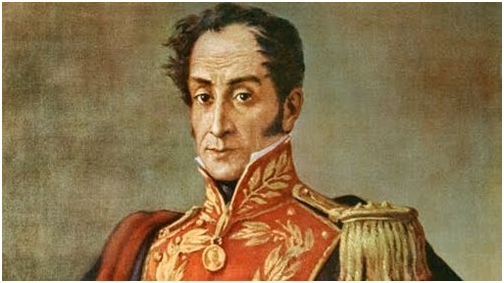
vendredi 28 mai 2010
14:00 à 14:25
Estados nacientes
y relaciones internacionales
/
Nouveaux Etats et relations internationales
président de séance : J. Gónzalez
Francis FEELEY, Univ.
de Grenoble III (France)
"The Monroe Doctrine (1823) and Its Historical Significance in the 'Clash of Civilizations'."
_____________________________________________________________________________________________________________
*******
FILM/DÉBAT
Université Stendhal à Grenoble
dans la grande salle des colloques
le jeudi 30 septembre
2010
à 17h30
AN INVITATION TO A SHOWING OF THE 1987 FILM,
"WALL STREET," ON THURSDAY, 30 SEPTEMBER, AT THE UNIVERSITY OF
GRENOBLE.
CEIMSA will present Oliver Stone's old film, Wall
Street, on campus Thursday
evening,
before you rush off to the cinema to see the sequel, 23 years later, Wall
Street Money Never Sleeps.
CEIMSA-IN-EXILE
(Center for the Advanced Study of American Institutions and Social
Movements)
IS PROUD TO PRESENT
THE SHOWING OF OLIVER STONE’S 1987 AWARD-WILLING FILM:
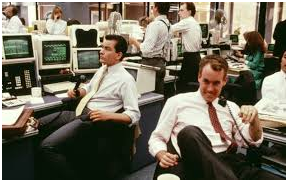
WALL STREET
(with Michael Douglas,
and Charlie Sheen)
Thursday
30 September
17h30
La Grande Salle des Colloques
To grasp the evolution of capitalist ideology during the past decades,
we encourage CEIMSA readers to also see, Wall
Street Money Never Sleeps. The expressions of "Social Darwinism" are becoming
more palpable in the capitalist culture industry.
_________________________________________________________________________________________________________________
*******
Rencontre / Débat
"War, Resistance
and Counter-Resistance in Modern Times"
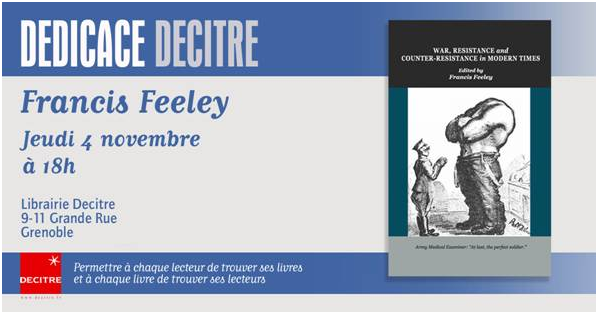
(publié
par Cambridge Scholars Publishing (Octobre 2010) sous la direction du Professeur
Francis Feeley)
à la librairie Decitre
9-11 Grande Rue, Grenoble
Jeudi 4 novembre à 18h00
PHOTOS FROM THE
"CONFERENCE DE PRESSE" AT THE DECITRE BOOKSTORE
TABLE OF CONTENTS
Dedication and
Acknowledgements
.....................................................................................................................
ix
Preface
...............................................................................................................................................................
xi
A Brief Overview of War, Resistance and Counter-Resistance
Francis Feeley
Introduction
.........................................................................................................................................................
1
A Look at Resistance in the American Democratic Tradition
Francis Feeley
Chapter
One.......................................................................................................................................................
17
Civilian and Military Resistance under the Vichy Government: A Personal
Testimony
Gilles Vachon
Chapter Two
.....................................................................................................................................................
53
Resistance and Counter-Resistance Growing up Black in America
George Brown
Chapter Three
...................................................................................................................................................
65
The Political Economy of 'Homeland Security' in the USA
Francis Feeley
Chapter Four ....................................................................................................................................................
85
The Coverage of Events in Post-Invasion Iraq.
Patrick Litsangou
Chapter Five ....................................................................................................................................................
95
U.S. Transnational Corporations and Counter-Resistance Strategies in the Niger
Delta
Peterson Nnajiofor
Chapter Six ....................................................................................................................................................
105
The Strategic Envelopment
Anthony Wilden
Conclusion......................................................................................................................................................
115
Francis Feeley
Contributors...................................................................................................................................................
119
_______________________________
******
LE CENTRE DE RECHERCHE
CEIMSA-IN-EXILE
Center for the Advanced Study of American Institutions and Social
Movements
VOUS PRESENTE :
Dans notre series sur
“War, Resistance and Counter-Resistance
In Modern Times”
“Yugoslavia: The
Avoidable War”
(The Horrors of the Balkan Wars
as Shrewdly Staged Illusions)
A documentary film directed by George Bogdanich
LE JEUDI, 18 NOVEMBRE 2010
à
17h30
Amphi 2
“Yugoslavia: The Avoidable War”
(2002)
On 24 March 1999, NATO began
its air attack on Yugoslavia. Before the war ended on 10 June 1999, Yugoslav
casualties, according to official reports, included 462 soldiers killed and 299
more wounded, 114 special police officers killed. There were between 500 and
1500 Yugoslav civilian deaths, according to various sources. European
non-governmental groups report that "a few" Italian soldiers have
died since the war ended due to the "use of weapons with cancer-causing
depleted uranium".
As the United States government has tacitly acknowledged by
keeping the press at bay in Afghanistan, public relations and the ability to
get your version of events across is almost as important as weaponry in modern
warfare. The version of a war that is reported on television becomes the
official version that in turn motivates crucial political decisions.
FILM REVIEW; The
Horrors of the Balkan Wars as Shrewdly Staged Illusions
By STEPHEN HOLDEN
Published: March 15, 2002
One of the many unsettling contentions of George Bogdanich's
documentary film, ''Yugoslavia, the Avoidable War,'' is its assertion that many
of the most horrendous events in the recent Balkan wars were stage-managed for
the news media. A number of the massacres and atrocities reported on television
with bodies on display, it maintains, were shrewdly planned illusions concocted
by the Bosnian Muslims to inflame international opinion against the Serbs. The
city of Sarajevo in particular served more than once as an accessible location
for deceptive television coverage.
Although it would be inaccurate to label this documentary pro-Serbian, the
film, which opens today at the Two Boots Pioneer Theater, methodically sets out
to demolish much of the conventional wisdom about who did what to whom and who
was to blame. It insists that a regional civil war that could have been settled
without prolonged bloodshed was turned into a major conflagration by outside
interference and national self-interest.
As the United States government has tacitly acknowledged by keeping the press
at bay in Afghanistan, public relations and the ability to get your version of
events across is almost as important as weaponry in modern warfare. The version
of a war that is reported on television becomes the official version that in
turn motivates crucial political decisions.
The film asserts that partly because of American television's need for
clear-cut heroes and villains, a scenario of good guys (the oppressed Bosnian
Muslims) versus bad (the evil, barbaric Serbs) came to dominate mainstream news
coverage of the war. After one reporter heard a Serbian use the words ''ethnic
cleansing,'' for instance, the term, with its repugnant genocidal associations,
was seized on by the Clinton administration as a buzzword and used to bash the
Serbs, when in fact all sides were equally intent on ''cleansing'' their
territories of undesirables.
This heroes-and-villains mentality, the film contends, also served American
interests by giving the United States an excuse to preserve and strengthen NATO
in the post-Communist era when its relevance had become debatable.
It allowed us to keep our power base in Europe. The film bluntly calls ''an
occupying force'' the NATO forces (led by the United States) that remain in
Kosovo, Bosnia and Macedonia without an official date for withdrawing, and it
goes so far as to accuse that 19-nation army of conspiring to commit war
crimes.
Almost anything we thought we knew about the Balkan wars is thrown into
question by the film. Did a highly publicized civilian massacre of Bosnian
Muslims by Serbs in Kosovo that prompted NATO to intensify the bombing of
Yugoslavia really take place? Or did Bosnian Muslims transport the bodies of
dead soldiers (not civilians) overnight to the site and then cry
massacre?
And what about the numbers? Subsequent investigations,
the movie claims, have shown that the tally of casualties at the hands of
Serbs, including the supposed mass rapes of Bosnian women, was outrageously
inflated.
Whether or not you're convinced by the film's assertions, many of which are
based on information provided by the Red Cross, Amnesty International, Human
Rights Watch and other organizations that investigated reported events after
the fact, ''Yugoslavia, the Avoidable War'' does an impressive job of relating
the complicated history of the war and of filling in the background. Some of
that background has been overshadowed by the designation of the Serbs as the
villains. The Croatians, it reminds us, collaborated closely with the Nazis
during World War II in the slaughter of 750,000 Serbs, Jews and Gypsies in
their territory.
As for the Bosnian Muslims, the film says there is ample evidence documenting
Bosnians' alliance with Osama bin Laden's Al Qaeda network.
Mr. bin Laden was a regular visitor to the office of
Bosnia's president Alija Izetbegovic in early 1993, a
time when the United States was lauding his commitment to moderation and
multiethnic cooperation.
As the meticulously chronological account of the Balkan wars unfolds event by
event, failed peace initiative by failed peace initiative, ''Yugoslavia, the
Avoidable War'' leads you to a no man's land of doubt.
The truth, of course, was never as black-and-white as it is has been painted
for us. It rarely is.
YUGOSLAVIA, THE AVOIDABLE WAR
Directed by George Bogdanich; directors of photography,
Michael Moser, Vladimir Bibic, Dragan
Milinkovic, David Hansen, Joe Friendly and Predrag Bambic; edited by Mary Patierno; title song, ''Road to Hell,'' by Chris Rea;
produced by Mr. Bogdanich and Martin Lettmayer; released by Hargrove Entertainmnet.
At the Two Boots Pioneer Theater, 155 East Third Street, East
Village. Running time: 165 minutes. This film
is not rated.
WITH: Sanya Popovic
(Narrator) and Lord Peter Carrington, James Baker, Lawrence Eagleburger, Hans
Dietrich Genscher, Nora Beloff,
Susan Woodward and Ted Galen Carpenter.
____________________________________________________________________________________________________________________
*******
LE CENTRE DE RECHERCHE
CEIMSA-IN-EXILE
Center for the Advanced Study of American Institutions and Social
Movements
VOUS
PRESENTE :
Dans
notre series sur
“War, Resistance and Counter-Resistance
In Modern Times”
Le Film
“Falluja, April 2004”

(v.o.)
par Doi Toshikuni
LE VENDREDI 4 MARS 2011
à
15h30
Amphi 2
In April 2004, Fallujah, an Iraqi city with about 300,000 population and
"100 mosques", were sieged and invaded by
thousands of US troops. Many reports said six or seven hundred people - Iraqi
civilians - were killed in the attack.
10 days after the siege of
the US forces had been lifted, Mr Doi,
a Japanese journalist, entered the besieged city, visited damaged houses,
destroyed buildings, hospital beds, makeshift clinics, and a football ground
turned a grave yard. He talked with the fathers, mothers, sons and daughters,
doctors and farmers, in the city.
Mr Doi has made a 55-minute
documentary film - "Falluja April 2004" -
out of his extensive video footages shot in the city in August 2003 (four
months after the "Iraq war") and May 2004 (right after the first Falluja siege; one month after it began). With no added
music or voice-overs, the film is not intended to be a "piece of
work" but a "sheer record of facts".
________________________________________________________________
*************
LE CENTRE DE RECHERCHE
CEIMSA-IN-EXILE
Center for the Advanced Study of American Institutions and Social
Movements
VOUS PRESENTE :
Dans notre series sur
“War, Resistance and Counter-Resistance
In Modern Times”
Le Film documentaire de 1974
Hearts
and Minds
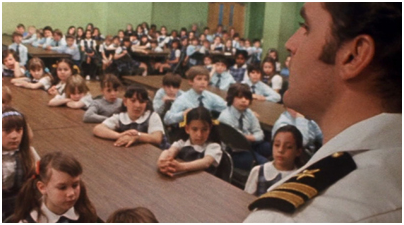
Peter Davis, directeur
LE VENDREDI, 25 MARS
à
15h30
La Grande Salle des Colloques
________________________________
Hearts and Minds has attracted extensive critical attention,
almost all of it either glowingly positive or damningly negative, but rarely
anything in between, with reviewers tending to treat it either as a masterpiece
in political documentary film making or as a hatchet job anti-Vietnam War
propaganda film, one that has received "passionately opposing views".
Vietnam War films from the 1960s to the 1970s reflected deep divisions at home
over the war. Some reflected pro-war sentiments and vilified anti-war
protesters, while others stood at the opposite end and criticized government
officials and policies. "Hearts and Minds" was one of the first of
the latter to have been produced and released before the war's end in 1975.
*********************
LE CENTRE DE RECHERCHE
CEIMSA-IN-EXILE
Center for the Advanced Study of American Institutions and Social
Movements
VOUS PRESENTE :
Dans notre series sur
“War, Resistance and Counter-Resistance
In Modern Times”
The Panama Deception
Film
documentaire de 1992
(v.o.)
LE VENDREDI 22 AVRIL 2011
à
15h30
La Grande Salle des Colloques
_________________________________________________________________________________________________________
*************************************
Conférence
internationale
à
l'Université de
Paris 10-Nanterre
dans
l'Amphi B-2
à
partir de 9h
le 19
mai 2011
sur
"L’ETHIQUE ET LA
POLITIQUE ETRANGERE AMERICAINE"
entire conference filmed by Christain
Bailly (click
here)
9h30 Accueil : M. Francis Feeley, Directeur
de recherches en les études américaines.
10h00
Session N° 1 : « Quel rôle joue la déontologie nationaliste dans
la politique étrangère des États-Unis ? Une perspective historique ».
Président : M. Francis Feeley.
1.
Yuri Stulov : « La politique étrangère des
États-Unis et les idéologies nationalistes en Biélorussie ».
2.
Mme. Nataliya Narochnitzkaya : « La démocratie au début du
vingt-unième siècle : la dégradation de sens et des valeurs ».
3.
M. Peterson Nnajiofor : « L’éthique et le capitalisme :
Les cas des capitalistes locaux dans les marchés émergents ».
4.
Mme. Susan George : « La finance américaine est par
nature internationale ».
14h00
Panel 2 : « Le rôle des entreprises transnationales dans la politique
étrangère des États-Unis ». Président : M. Pierre Guerlain.
5.
M. Stefan Karganovich : « L’Uranium
appauvri comme instrument de terreur et ses conséquences à long terme sur les
systèmes biologique et écologique ».
6.
Mlle. Asma Jedidi : « La ‘NGO-ization’
de la lutte pour la paix dans la 21ème Siècle ».
7.
M. Ahmed El Aidi : « La mondialisation et ses effets au
Mexique et au Maroc ».
17h00
Session N° 3 : « Le militarisme étatsunien et les stratégies
pour survivrel ». Présidnet :
M. Yuri Stulov.
8.
Mme. Diana Johnstone : « La faillite morale de l’Otan ».
9.
M. John Laughland : « Qui garde les gardiens ? (La
politique étrangère américaine et le droit pénal international) ».
10.
M. William Blum : « Les mythes de la politique
étrangère américaine/ ».
Discussion
publique.
19h00 M. FrancisFeeley : Conclusion.
Interviews with the
participants:
At
a café near the Jardin Luxembourg (ParisVI), 18 oct. 2011,
and
In the lobby in front of
the conference hall on the University of Paris-Nanterre campus, 19 oct. 2011 :
·
with
Asma Jadidi and Marwen Rahif
&
·
with Susan George and William Blum.
19h30
Récital
:
Rozlyn Zinn (1922-2008)
&
Howard Zinn (1922 – 2010)
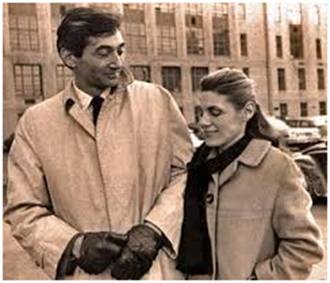
Beethoven :
Sonate ‘Clair de lune’
Adagio
interpétés par
Tatiana Baklanova Feeley
(piano)
au Restaurant « Le Coin Tranquille »
8/10 Rue du Docteur Foucault 92000 Nanterre vieux centre
20h
Dîner collectif au restaurant « Le Coin Tranquille »
___________________________________________
NANTERRE
Journée d’études, avec William Blum, Susan George, Diana Johnstone, Yuri
Stulov, Nataliya Narochnitzkaya,
Marwen Rahif... Le CREA accueille les enseignants-chercheurs de l’UFR LCE dont
le champ de recherche relève du domaine des études anglophones. Il est ouvert à
de nombreux chercheurs d’autres universités, françaises. Directrice :
Professeur Chantal Delourme L’ETHIQUE ET LA POLITIQUE ETRANGERE AMERICAINE
Cette journée d’études organisées est par Professeur Francis Feeley, membre du
CREA.
Le Jeudi 19 mai 2011. De 9:00 à 20:00. Université de Paris
Ouest-Nanterre-La Défense Amphi B-2. LE PROGRAMME COMPLET:
http://anglais.u-paris10.fr/spip.php?article1729
et
http://dimension.ucsd.edu/CEIMSA-IN-EXILE/newsletter/newsletter45.html
_________________________________________________________________________________
***********
LE CENTRE DE RECHERCHE
CEIMSA-IN-EXILE
Center for the Advanced Study of American Institutions and Social
Movements
VOUS PRESENTE :

(v.o.)
LE MARDI 4 OCTOBRE 2011
à
17h30
La Grande Salle des Colloques
Avec un débat animée par les Professeurs d'Etudes Americaines,
Francis Feeley (Grenoble) et Andrew Cornell (NYU)
_________________________________________________
This film, which
explores the history of incongruence between American capitalism and democracy,
is evidently a culmination of Moore's lifetime of research into this topic: he
begins the movie by admitting his longstanding interest, rooted in childhood
experiences in Flint, Michigan. As a result, the film displays an expertise
that is less irritating than in Moore's earlier works, in which various
loopholes can be found in one-sided presentations (see Bowling for
Columbine). Using clips of FDR and Jimmy Carter warning against greed and
inequality, Moore shows how gradually Americans came to accept Reaganomics,
corporate corruption, then Bush-era swindling over time. This history serves as
context for his explanation of the housing crisis, the collapse of banks, and
Bush's covert, last-ditch efforts to pass sketchy bills on the cusp of Obama's
election. Moore asks several lawyers, senators, and bankers, "What the
**** happened?" and each offers intelligent assessments of situations that
many American viewers still struggle to comprehend.
Like Robin Hood, Moore seeks justice, but his greatest strength is as a
translator between those speaking a complex political language and his
viewers. Capitalism: A Love Story does much to relay a
complicated history that we all need to know for the sake of our own
empowerment.
_______________________________________________________________________________________
*******
LE CENTRE DE RECHERCHE
CEIMSA-IN-EXILE
Center for the Advanced Study of American Institutions and Social
Movements
VOUS PRESENTE :
Film-Débat
“Animal Farm”
v.o.
Director
John Stephenson
(2000)
Jeudi 23 février de 17h30 à 19h30
La Grande Salle des Colloques
Professeur Francis Feeley a l'honneur d'inviter des collègues et des étudiants
à la projection du film basé sur le livre célèbre de George Orwell, « La
ferme des animaux » (1946).
Ce film sera suivie
d’un dialogue avec le public.
La rencontre sera animée par Francis Feeley, professeur de civilisation
américaine.
Pour
plus d'informations
Contact :
Francis.Feeley@u-grenoble3.fr
_________________________________________________________________________________
************
LE CENTRE DE RECHERCHE
CEIMSA-IN-EXILE
Center for the Advanced Study of American Institutions and Social Movements
VOUS PRESENTE :
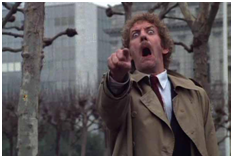
Invasion of the Body Snatchers
LE JEUDI 5 AVRIL 2012
à
17h30
La Grande Salle des Colloques
Invasion of the Body
Snatchers is a 1956 American science fiction film directed by Don Siegel and
starring Kevin McCarthy and Dana Wynter. Daniel
Mainwaring adapted the screenplay from Jack Finney's 1954 novel The Body
Snatchers.
The story depicts an
extraterrestrial invasion in a small California town. The invaders replace
human beings with duplicates that appear identical on the surface but are
devoid of any emotion or individuality. A local doctor uncovers what is
happening and tries to stop them.
In the fictional town of
Santa Mira, California, Dr. Miles Bennell (Kevin
McCarthy), a local doctor, finds a rash of patients accusing their loved ones
of being impostors. Another patient is a former sweetheart of his, recent
divorcée Becky Driscoll (Dana Wynter), who tells him
that her cousin, Wilma, has this same strange fear about Uncle Ira. Dr. Dan
Kauffman (Larry Gates), a psychiatrist in the town, assures Bennell
that the cases are nothing but "epidemic mass hysteria".
That same evening Bennell's friend Jack Belicec (King
Donovan) finds a body with his features, though not yet fully developed. The
next duplicate found is a copy of Becky in her home's cellar. When Bennell calls Kauffman to the scene, the bodies have
mysteriously disappeared, with Kauffman suspecting Bennell
of falling for the same hysteria. The following night Bennell,
Becky, Jack and Jack's wife Teddy again find duplicates of themselves, this
time emerging from giant pods. They conclude that the townspeople are in fact
being replaced in their sleep by perfect physical copies.
In 1994, Invasion of the
Body Snatchers was selected for preservation in the United States National Film
Registry by the Library of Congress as being "culturally, historically, or
aesthetically significant.
___________________________________________________________________________________________________
***********
Détours
de Babel
Festival
des musiques du monde contemporaiin
Le jeudi 5 avril
au
Prunier Sauvage
19h
Rencontre avec les
(Umar
Bin Hassan and Abiodun Oyewole)
avec
une introduction par le professeur Francis Feeley
__________________________________________________________________________________________________
*********************
LE CENTRE DE RECHERCHE
CEIMSA-IN-EXILE
Center for the Advanced Study of American Institutions and Social
Movements
VOUS
PRESENTE :
«BURN»
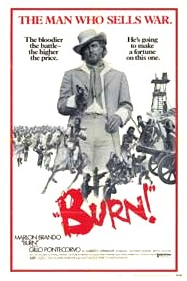
Film de Gillo Pontecorvo
(en anglais)
LE JEUDI 26 AVRIL
à
17h30
GRANDE SALLE DES COLLOQUES
______________________________
Avec Marlon Brando, ce film franco-italien s'agit de la politique d’une colonie
anglaise dans des Caraïbes durant la première moitié du 19ème siècle. Réalisé
par Gillo Pontecorvo, ce film raconte l'histoire
d'une révolte d'esclaves sur la petite île, Quelmada,
qui se bat pour son indépendance nationale contre la domination coloniale. Cette
représentation artistique de Pontecorvo est une
fiction historique, basé sur un composite de plusieurs des événements dans le
passé réel, y compris la guerre de l'indépendance haïtienne, dirigée par
Toussaint L'Ouverture au début du 19ème siècle.
____________________________________________________________________________________________
************
"The Art and Science of
Community Organizing"
A. Statement of
Motivation for the Conference Series on "Community Organizing."
B. Invitation
to the Conference Series, 2012-2013.
C. Conference #1 : (11-14 octobre 2012) « Festival
pour repenser la société », Université de Grenoble, Salle Berlioz.
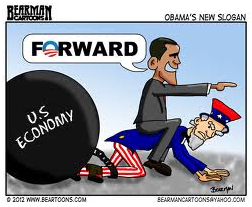
o
Program
o
Photos
o
Films
Rules for Revolution, neo-conservative commentary by
David Horowitz.
Films of Conference #2
roundtable discussions at Nanterre, on November 12, 2012) :
· Discussions
at Round Table 1 : http://youtu.be/1vhHMHouwec
· Discussions
at Round Table 2 : http://www.youtube.com/watch?v=Pe7MAn_VbTM
·
Discussions at Round Table 3 : http://youtu.be/WHCePuN1fbA
·
Michael Albert at the
Nanterre Conference #2 (12 November 2012) : "International Organizing at
the Local Level" :
§ Part
1 http://youtu.be/WfuEqLI5wLc
§ Part
2 http://youtu.be/3cyg2Fk0LNA
§ Part
3 http://youtu.be/BIyAqi6Fhsk
·
Program
·
Film
F. Publications
& Films :
§ Rules for Revolution, neo-conservative commentary by David Horowitz.
§ Films of Conference #2
roundtable discussions:
§ Discussions at Round Table 1 : http://youtu.be/1vhHMHouwec
§ Discussions at Round Table 2 : http://www.youtube.com/watch?v=Pe7MAn_VbTM
§ Discussions at Round Table 3 : http://youtu.be/WHCePuN1fbA
Michael Albert at the Nanterre Conference #2 (12
November 2012) : "International Organizing at the Local Level".
- Part 1 http://youtu.be/WfuEqLI5wLc
- Part 2 http://youtu.be/3cyg2Fk0LNA
- Part 3 http://youtu.be/BIyAqi6Fhs
- Films of Conference #3 :
- For the complete list of
films of the April 2013 Conference, please visit : http://dimension.ucsd.edu/CEIMSA-IN-EXILE/colloques/Conference.3.2013.wLINKS.htm
______________________________________________________________________________________________________________________________
*****************
LE CENTRE DE RECHERCHE
CEIMSA-IN-EXILE
Center for the Advanced Study of American Institutions and Social Movements
VOUS PRESENTE :
https://cdn1.vox-cdn.com/uploads/chorus_asset/file/3334090/wizard_of_oz.0.jpg
(en anglais)
(1939)
Un film musical américain de Victor Fleming
Adapté du roman « The Wonderful Wizard of Oz »de
L. Frank Baum, qui a écrit cet allégorie populiste en 1900
LE JEUDI 25 OCTOBRE
à
18h30
GRANDE SALLE DES COLLOQUES
______________________________
Fortement
ancré dans la culture populaire américaine, Le
Magicien d'Oz est le film qui a été le plus vu dans
le monde d'après la Bibliothèque du Congrès américain. Il est classé au
Registre international Mémoire du monde de l'UNESCO.
Une petite fille du nom de Dorothée, qui habite au Kansas, est enlevée avec sa
maison par une tornade et transportée dans un pays merveilleux du nom d'Oz («
Oz » étant une unité de poids des métaux précieux, l'once ; « troy ounce » en anglais). La
maison tombe sur la tête de la méchante sorcière de l'Est et la tue sur le coup
; Dorothée récupère les souliers d'argent (de rubis dans le film de 1939) de la
sorcière. Pour trouver un moyen de rentrer au Kansas, la gentille sorcière du
Nord lui conseille de demander au grand et puissant magicien d'Oz, qui habite
la cité d'Émeraude. Mais le magicien se trouve être un imposteur. il ne peut pas ramener Dorothée au Kansas. Il construit pour
cela un ballon, mais le ballon s'envole avec le magicien et sans Dorothée. En
fin de compte, Dorothée peut rentrer chez elle grâce à l'aide de la gentille
sorcière du Sud, qui lui apprend que les souliers d'argent peuvent l'aider : il
lui suffit de claquer trois fois des talons et d'exprimer un souhait.
______________________________________________________________________________________________________________________
***************
Projection-débat
Francis
Feeley
Professeur
des Etudes américaines
et
Directeur du
Center for the Advanced Study
of American Institutions and Social Movements
(CEIMSA-IN-EXILE)
à
L’ Université de Californie
VOUS PRESENTE
Un film documentaire sur le terrorisme de
l’Etat aux Etats-Unis dans les années 1950 :
The Un-Americans
v.o.
(From
the BBC TimeWatch series)
Archie Baron, producer
LE VENDREDI, 14 DECEMBRE 2012
à
18h30
LA GRANDE DE SALLE DES COLLOQUES
_________________________________________________________
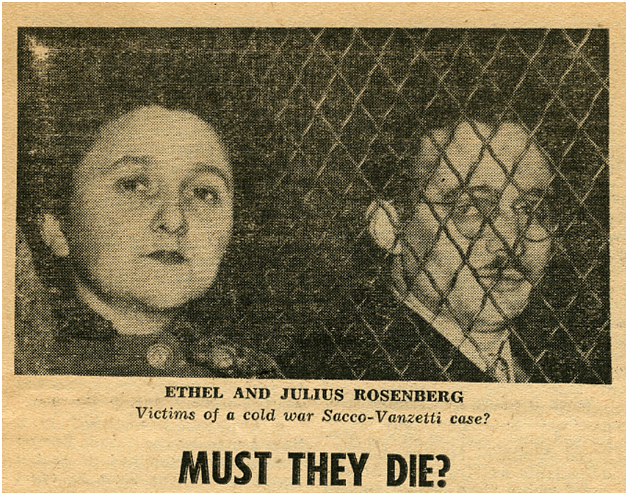
THE UNAMERICANS Between 1945 and the early 50's the lives of thousands of
ordinary citizens were destroyed because they were accused of un-American
activities. Government workers, teachers, union leaders, scientist, artists,
writers-anyone who expressed a liberal or leftwing opinion could be identified
as a Communist or a fellow traveler.
In this film both the anti-Communists and the victims of the notorious McCarthy
witchhunts talk candidly about the era of
anti-Communist hysteria and blacklists. We meet men and women who had joined the
Communist Party out of idealism and in reaction to injustices in American
society, such as poverty, and racism. They had no thoughts of violently
overthrowing the government and indeed, only 43,000 Americans were members of
the Communist party.
More than 400 people were brought to trial and about a third were
sent to prison and assessed huge fines. The execution of the Rosenbergs was the culmination of the hysteria. Arthur Kinoy, a constitutional lawyer, recalls his efforts to stay
the execution. Archival newsreels, old propaganda films, and newspaper cartoons
recapture those days.
_________________________________________________________________________________________________________________
***************
LE CENTRE DE RECHERCHE
CEIMSA-IN-EXILE
Center for the Advanced Study of American Institutions and Social
Movements
VOUS PRESENTE :
« Berkeley
in the Sixties »
Stop the machine!
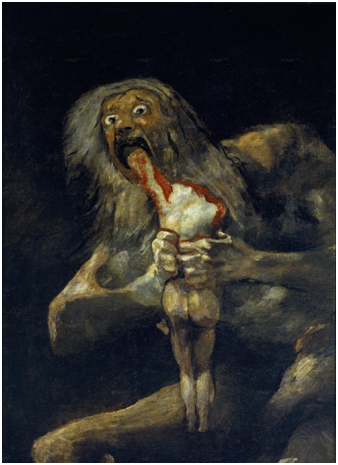
Source: Francisco Goya, The Black Paintings (1821-1823): “Saturn
devouring his children”.
Film
documentaire de Mark Kitchell (1990), 117 min.
VO
LE MARDI 8 OCTOBRE
à
17h30
GRANDE SALLE DES COLLOQUES
__ ______________________________
The origins of the Free
Speech Movement at the University of California–Berkeley begin with the May
1960 House Un-American Activities Committee hearings at San Francisco City
Hall, the development of the counterculture of the 1960s in Berkeley,
California, and ending with People's Park in 1969. The film features 15 student
activists and archival footage of Mario Savio, Todd Gitlin, Joan Baez, the Rev. Dr. Martin Luther King Jr.,
Huey Newton, Allen Ginsberg, Gov. Ronald Reagan and the Grateful Dead.[1] This
film, dedicated to Fred Cody, the founder of Cody's Books, was nominated for an
Academy Award for Best Documentary Feature.
_________________________________________________________________________________________________________
***********
LE CENTRE DE RECHERCHE
CEIMSA-IN-EXILE
Center for the Advanced Study of American Institutions and Social
Movements
VOUS PRESENTE
Projection-débat

(v.o.)
LE JEUDI 20 FEVRIER 2014
à
17h30
La Grande Salle des Colloques
Débat animé par Francis Feeley, professeur en études
américaines, avec les professeurs d'economie Marc Troisvallets et Marc Ollivier.
_________________________________
Il s'agit d'un film documentaire américain
réalisé par Michael Moore en 2009. Le film traite de la crise financière de
2007 à 2009 et sa relance, tout en portant un acte d'accusation contre l'ordre
économique actuel aux États-Unis et le capitalisme en général.
_______________________________________________________________________________________________________________________________
************
Conférence
"Les
États-Unis et le Mexique, un siècle après la révolution"
Jeudi 17 avril, 17h30 à 20h
Salle Jacques Cartier
Maison des langues et des cultures
Conférence donnée par James Cohen (Professeur, département du monde anglophone,
Université Sorbonne-Nouvelle Paris 3),
et Francis Feeley (Professeur des études américaines, Université de Grenoble3).
Sujets de débat :
- l'immigration ;
- la
frontière ;
- le
«libre-échange» ;
- les interconnexions des capitalismes du monde
;
- le trafic de drogues et d'armes et la
«sécurisation» des relations le Mexique ;
- et aussi, plus généralement, l'examen des
relations états-uniennes avec l'Amérique latine.
_________________________________________________________________________________________________
***********
Le Repaire de « Là-bas si j’y suis »
Grenoble - Meylan
Là
où la citoyenneté active se construit
Le mercredi 21 mai 2014
Au restaurant bio « la balade des joyeux
marmitons » à 19h
MEYLAN
18 rue des Aiguinards (à côté de
l’Hexagone – scène nationale)
« La lutte des classes aux
Etats-Unis : comment les stratégies capitalistes ont été imposées
avec succès à la classe ouvrière »
Intervention-débat
avec Francis FEELEY, professeur des universités à
l’université STENDHAL de Grenoble 3.
Director
of research university of Paris X-Nanterre - Center for the advanced study of
American institutions and social movements at the University of California-San
Diego (UCSD).
Depuis
le début du 20e siècle, la lutte des classes aux Etats-Unis a évolué vers un
contrôle des classes dominées de plus en plus systématique.
Après :
- la guerre
Hispano-Américaine (1898) : le mouvement du
« Progressive » (1901-1917).
- la 1ère
guerre mondiale (1914-1918) : la première alerte rouge et la grande
dépression de 1933 à 1941.
- la 2e
guerre mondiale (1939-1945) : la guerre froide de 1945 à 1989.
- la guerre
du Vietnam (1961-1976) : la « contre-révolution » du
président REAGAN & co (1980 à nos jours).
La
classe dirigeante américaine, qui a toujours profité du système d’exploitation
militariste, nationaliste et largement inégalitaire, a tiré les leçons du
passé. Sa tactique a évolué à travers le siècle dans une direction
opposée aux politiques précédentes ouvertement coercitives. Cette classe
dirigeante utilise des méthodes plus subtiles pour influencer et façonner la
société civile.
Le financement sélectif des organisations civiles, des médias, des partis
politiques et des syndicats assure l’hégémonie d’une
« culture-idéologie » du consumérisme et de l’individualisme. Il
favorise le développement des attitudes et des croyances qui facilitent la
domination consensuelle.
Le résultat est que « l’agence humaine » (c.àd.
la citoyenneté active) est masquée et les changements sociaux sont de plus en
plus perçus comme « historiquement prédéterminés».
Dans ce contexte, la violence de la classe dirigeante est un signe de
faiblesse. Le système capitaliste à la recherche de la stabilité sociale a
toujours tôt ou tard donné naissance à de nouvelles tactiques…
Le repaire de Grenoble-Meylan
Le
3e mercredi du mois, au restaurant « la balade des joyeux marmitons »
à 19h
à MEYLAN (à côté de l’Hexagone)
A suite des débats, nous pourrons les poursuivre en dégustant les plats
savoureux bio de Virginie et de son équipe.
Contact : philippe.savalle38240@gmail.com 06
80 42 53
84
Le réseau des Repaires du Sud-Est
Aix en Provence Aubagne Château-Arnoux Crolles-Grésivaudan Grenoble-Meylan
Grasse Marseille-Montauroux Nice Nimes Salon de
Provence Tourettes
« là-bas si j’y
suis » Une émission de Daniel MERMET sur
France-Inter de 15h à 16h du lundi au
jeudi la-bas.org
_______________________________________________________________________________________________________
***************
Projection-débat
Jeudi 2 octobre à 17h30
Grande salle des colloques
How the West Was Lost
(vo)
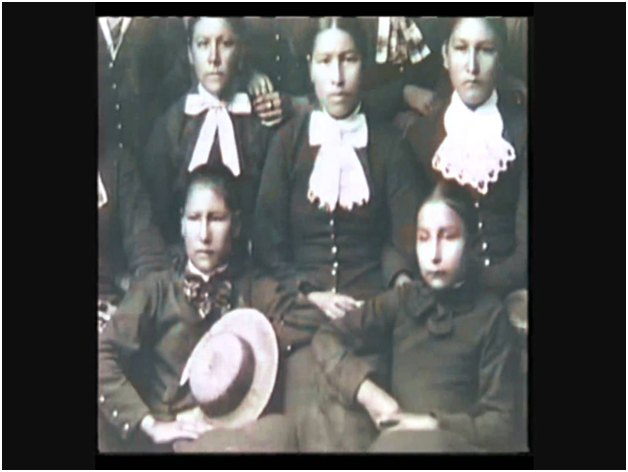
Projection du film en version originale.
Présentation par Francis Feeley, Professeur des Etudes américaines, et
Directeur du CEIMSA.
Ce documentaire
fascinant explique comment l'Ouest américain a été irrémédiablement perdu pour
les peuples autochtones d'Amérique du Nord. Il inverse la saga du
« conquête de l'Ouest » et raconte plutôt l'histoire de la
colonisation de l'Ouest américain du point de vue des Américains indigènes dont
les terres ont été perdus au cours d'une période de seulement un demi-siècle à
des vagues de les Blancs qui sont venus de l'est, dans la seconde moitié du
19ème siècle.
En témoigne le sort
tragique de la Navajo, Nez Perce, Apache, Cheyenne, et les tribus Lakota à travers leurs yeux et leurs mots. Souvenirs
poignants de descendants indiens, vidéo étonnante, des documents historiques
rares et photographies d'archives sont inclus dans cet ensemble de trois
volumes
________________________________________________________________________________________________________
*******************
Projection-débat
Jeudi 27 novembre à 17h30
à l’université Stendhal
Salle F-109
“The Ludlow Massacre”
(l’autre guerre de 1914)
Film
documentaire sur la guerre civile dans les Montagnes Rocheuses dans le sud de
Colorado en avril 1914, où la Garde nationale du Colorado et les milices
privées de John D. Rockefeller et son entreprise, Colorado
Fuel and Coal Company, ont
attaqués les 1.200 grévistes mineurs et leurs familles dans la colonie qu’ils
ont construit devant les mines de charbon pendant la grève. Environ deux
douzaines de personnes, dont des femmes et enfants, ont été tués. Le
propriétaire chef de la mine, John D. Rockefeller, Jr. ,
a été largement critiquée pour l'incident.
Ce
documentaire inclus des entretiens avec les participants à cette fameuse grève
qui racontent les conditions de travail des mineurs à cette époque, aussi bien
que les extraits de films du massacre, le point culminant d'une grève
généralisée sanglante contre les mineurs de charbon du Colorado, qui a abouti à
la mort violente de entre 19 et 26 personnes; dont deux femmes et onze enfants,
asphyxiés et brûlés à mort sous une seule tente. Les décès sont survenus après
un combat d'une journée entre les milices et les camps gardes contre les
travailleurs en grève. Ludlow est le seul et le plus meurtrier incident de
grève industrielle dans le sud du Colorado, qui c’est étendu de Septembre 1913
à Décembre 1914. La grève a été organisée par les United Mine Workers of America (UMWA) contre
les sociétés minières de charbon dans le Colorado.
Contact : francis.feeley@u-grenoble3.fr
Voir,
aussi, la chanson de Woody Guthrie: « The Ludlow Massacre »
et
Philip Foner,
"History of the US Labor Movement," Vol. 5: The AFL in the
Progressive Era (chapter 9).
_____________________________________________________________________________________________________________________________
* * * * * * * * *
Etc . . .
etc . . .
etc
. . .





